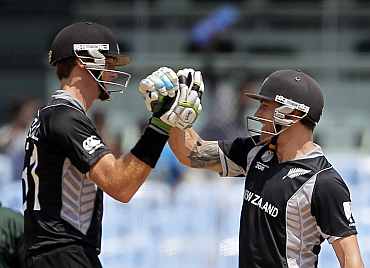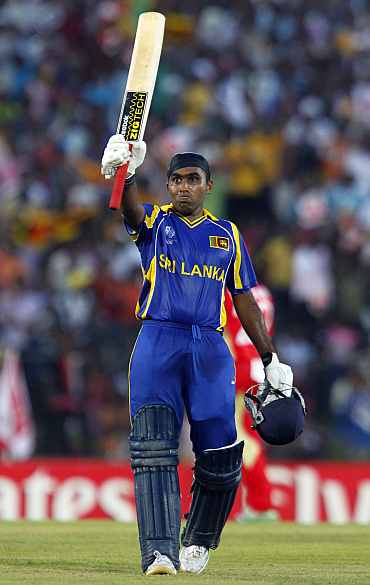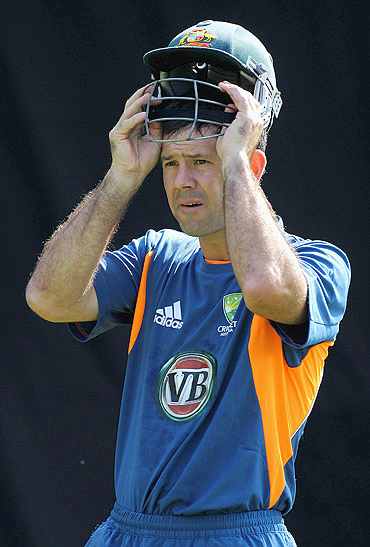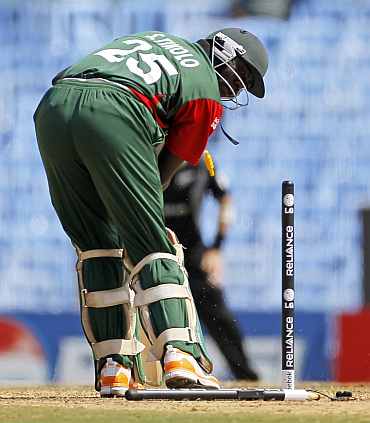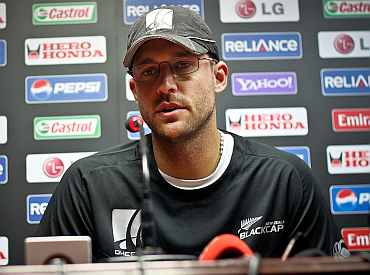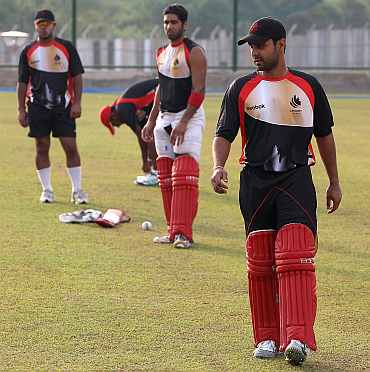 | « Back to article | Print this article |
Kenya-NZ match was wrapped up in just 150 minutes
Crushing defeats for Kenya and Canada on Sunday added two more reasons why the governing body has decided that the sport's showpiece World Cup should no longer be a place for cricket's cannon fodder.
- Minnows have no place at the WC: Ponting
New Zealand have hardly set the one-day game alight recently but they made ruthlessly short work of the Africans in a 10-wicket victory, embarrassing Kenya's illustrious fielding coach Jonty Rhodes who saw his team skittled for 69.
The Kiwis openers then mopped up the victory target in exactly eight overs before presumably returning to the pavilion to thank bowlers Tim Southee (3-13), Hamish Bennett (4-16) and Jacob Oram (3-2) for organising such a short day at the office.
A match that should have lasted up to seven hours and 100 overs reached its conclusion in just 150 minutes, with a combined total of 31.5 overs bowled.
Jayawardene in record books
In the day/night game, Sri Lanka allowed Canada precious little more respect in dismissing them for 122 in pursuit of a whopping 332-7 after Mahela Jayawardene helped himself to his country's fastest ever World Cup century in only 80 balls.
Jayawardene made mincemeat of the Canadian attack and was joined in the fun by skipper Kumar Sangakkara, who was out eight runs short of a century.
The results would appear to vindicate ICC chief executive Haroon Lorgat's decision to cut the number of teams at the 2015 World Cup in Australia and New Zealand from 14 to 10.
'We all want to see the game develop'
Barring cricket's so-called 'minnows' from the game's 50-over top table, has been a major talking point in the sub-continent since he confirmed it on Friday.
On Sunday, Australia's Ricky Ponting, a man who has lifted the trophy on the last two occasions it was contested in 2003 and 2007, weighed into the debate and backed Lorgat's stance.
Ponting did not dispute their need for the "small nations'" exposure to the big guns but was not sure if the World Cup was the right stage.
"You need to be bringing some of these small nations into the world of cricket," Ponting said in Ahmedabad on Sunday.
"We all want to see the game develop and blossom in different countries around the world.
"But I have always been unsure if World Cups and Champions Trophies are the right places to do that. At the moment really I am not sure how much the teams actually learn in tournaments like that," he added.
'It would be a better tournament if there are fewer teams'
The ICC's associate members, the countries not yet accorded full test-playing status, have already made murmurings of opposition to this kind of view and can point to a number of upsets over the years to back their case.
In 2007, both India and Pakistan, among the favourites here, were sent packing early after respectively losing to the lightly regarded Bangladesh and Ireland.
"At the end of the day, it (World Cup) would be a better tournament if there are fewer teams but we understand the responsibility for the game to continue to involve them as well," Ponting said.
'I can see the benefits of both'
New Zealand skipper Daniel Vettori, speaking a day before Sunday's handsome win, would not insist on their World Cup participation either as long as they continued to develop.
"I can see the benefits of both because I have played in both formats," Vettori said.
"Just as long as development of those associate members continue, that's important. Whether that's done at a different level, that's up to the ICC."
The ICC, for its part, plans to accommodate more associate members in the Twenty20 World Cup but the trade-off does not satisfy Canada captain Ashish Bagai.
"I don't think it's going to help many countries produce top level Test cricketers," he said.
"It's really going to hold back the growth of the game. If they want to keep it to 10 teams, that's fine, but it's never going to be a global sport," he added.
'Of course the emerging nations should stay in it'
England spinner Graeme Swann, Australia's Shaun Tait, West Indian Kieron Pollard, South African AB de Villiers, New Zealand's Brendon McCullum and Indian Suresh Raina have waded into the debate, championing the associate teams' cause.
"Of course the emerging nations should stay in it. Why would you want to take the world out of the World Cup? Shocks can happen," Swann told The Wisden Cricketer magazine.
Like Bagai, Kenya captain Jimmy Kamande is upset at the ICC move which he feels would deny players like him the opportunity of learning from top players.
"It's up to ICC to decide whether they want 10, five or 50 teams in the World Cup but the thing is the more we get to play against these (test) teams, the better we become," he said.

© Copyright 2024 Reuters Limited. All rights reserved. Republication or redistribution of Reuters content, including by framing or similar means, is expressly prohibited without the prior written consent of Reuters. Reuters shall not be liable for any errors or delays in the content, or for any actions taken in reliance thereon.
